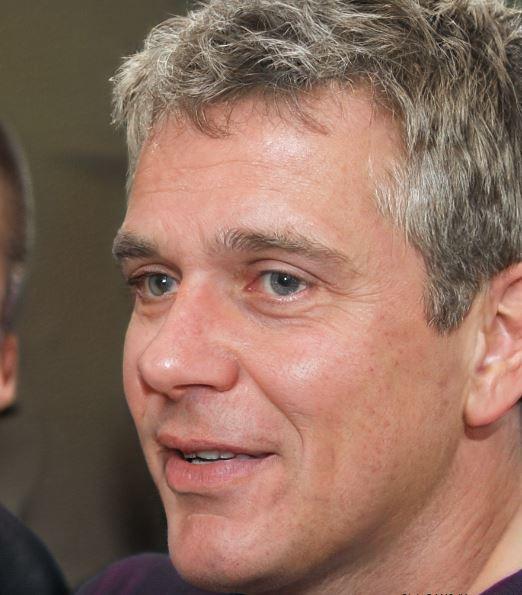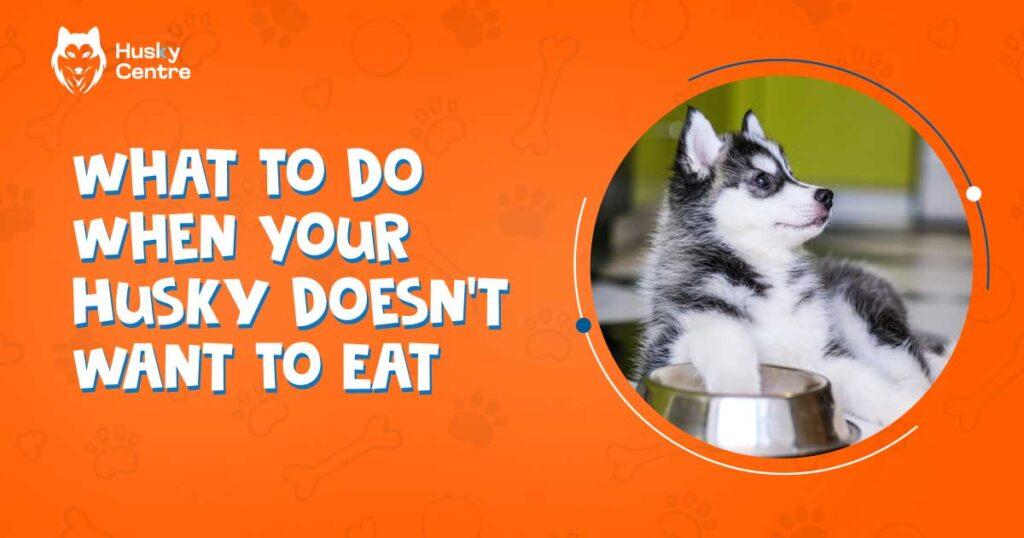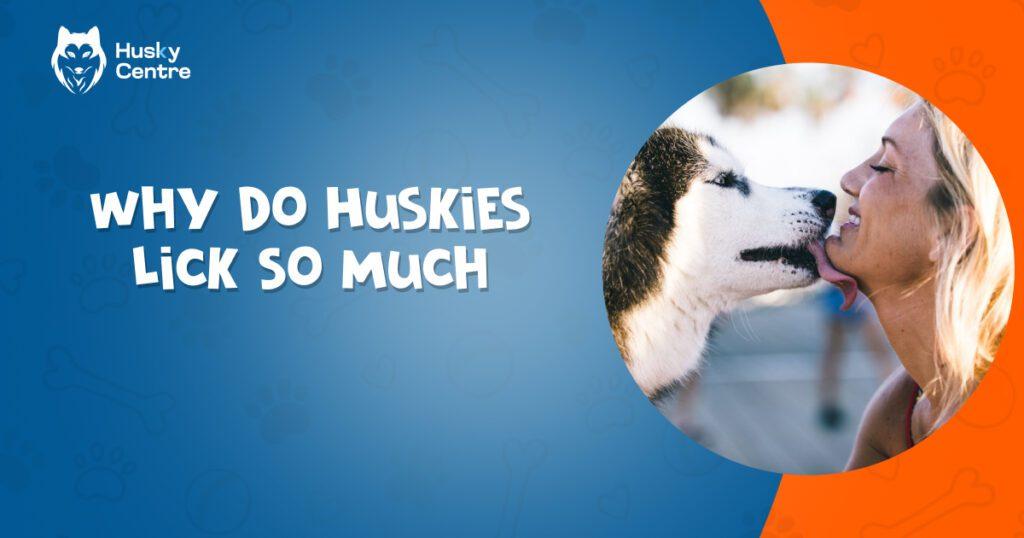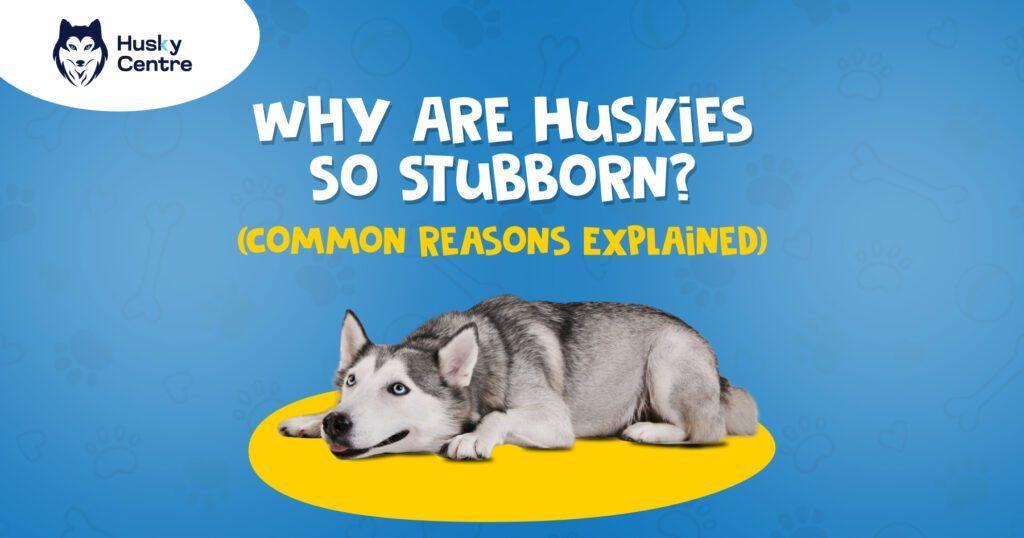Check for underlying health issues or dental problems first. Consult a veterinarian if your husky refuses to eat.
Huskies are known for their independent and sometimes stubborn nature. This can extend to their eating habits, making it challenging for owners. Skipping meals occasionally might be normal, but persistent refusal to eat is concerning. It could indicate health problems, dental issues, or stress.
Ensuring your husky is healthy and happy is crucial. Monitor their eating behavior and consult a vet if needed. A balanced diet and regular mealtime routine can also help. Understanding your husky’s unique needs and preferences can improve their appetite. Proper care and attention ensure your husky stays healthy and well-nourished.
Common Reasons For Loss Of Appetite
Introduction paragraph about What to Do When Your Husky Doesn’T Want to Eat and Common Reasons for Loss of Appetite:
Has your Husky suddenly stopped eating? A Husky’s loss of appetite can be worrying. Understanding the common reasons behind this behavior is crucial. Let’s explore the potential causes and solutions to help your furry friend regain their appetite.
1. Illness
If your Husky is sick, they might not feel like eating. Common illnesses that cause loss of appetite include:
- Infections
- Dental issues
- Stomach problems
Consult your vet if you suspect an illness is the cause.
2. Stress or Anxiety
Stress can affect your Husky’s eating habits. Changes in the environment, such as moving to a new home, can trigger anxiety. Other stressors include:
- New family members
- Separation anxiety
- Loud noises
3. Recent Vaccinations
Vaccinations are essential but sometimes cause side effects like loss of appetite. If this is the case, your Husky should return to normal eating within a day or two.
4. Food Preferences
Huskies can be picky eaters. They might lose interest in their current food. Try changing their diet or introducing new flavors.
5. Age
Aging can affect your Husky’s appetite. Older dogs may have decreased metabolism and energy levels. Consult your vet for appropriate dietary adjustments.
6. Dental Problems
Dental issues can make eating painful. Check for signs like:
- Bad breath
- Swollen gums
- Difficulty chewing
Regular dental check-ups can prevent these issues.
7. Medications
Some medications cause a loss of appetite as a side effect. If your Husky is on medication, discuss alternatives with your vet.
8. Weather
Hot weather can reduce your Husky’s appetite. Ensure they have a cool, comfortable place to eat and drink plenty of water.
Understanding these common reasons for loss of appetite can help you address the issue effectively. Always consult your vet for persistent problems.
Identifying Potential Health Issues
When your husky doesn’t want to eat, it can be worrying. Identifying potential health issues is crucial. Knowing what to look for helps you take quick action. This guide dives into symptoms and conditions that might affect your husky’s appetite.
Potential Dental Problems
Dental issues can make eating painful. Check for swollen gums, broken teeth, or bad breath. These signs might mean a dental problem. Your vet can provide the best treatment for dental issues.
Gastrointestinal Issues
Gastrointestinal problems can cause a loss of appetite. Look for vomiting, diarrhea, or bloating. These symptoms might indicate an upset stomach or more serious issues like a blockage. A vet visit is essential if these symptoms persist.
Parasites
Parasites can affect your husky’s appetite. Watch for weight loss, diarrhea, or a dull coat. These signs might mean a parasitic infection. Regular check-ups and treatments can keep your husky parasite-free.
Chronic Illness
Chronic illnesses like diabetes or kidney disease can impact eating habits. Notice if your husky drinks more water, urinates frequently, or seems lethargic. These signs warrant a vet examination to rule out chronic conditions.
Stress And Anxiety
Stress and anxiety can affect eating. Changes in routine, new environments, or loud noises can stress your husky. Ensure a calm and consistent environment. If stress persists, consult your vet for advice.
Checking For Physical Symptoms
When your Husky doesn’t want to eat, it can be a worrying experience. One of the first steps to address this issue is checking for physical symptoms.
This helps identify if there’s a medical reason behind their loss of appetite. Here are some key areas to inspect to ensure your furry friend is healthy.
Check For Dental Issues
Inspect your Husky’s mouth for signs of dental problems. Look for swollen gums, broken teeth, or foul breath. Dental pain can make eating uncomfortable.
Examine Their Coat And Skin
A healthy Husky has a shiny coat. Check for dry, flaky skin or excessive shedding. These can indicate nutritional deficiencies or allergies affecting their appetite.
Monitor Weight And Body Condition
Track your Husky’s weight regularly. Sudden weight loss can be alarming. Use a table to record their weight weekly:
| Week | Weight (lbs) |
| 1 | 50 |
| 2 | 49 |
| 3 | 48 |
Observe Their Energy Levels
Notice if your Husky is less playful or more lethargic. Low energy can be a sign of illness, making them less likely to eat.
Inspect For Gastrointestinal Issues
Check for signs of vomiting, diarrhea, or constipation. These symptoms can cause a loss of appetite and require immediate attention.
Check Their Eyes And Nose
Healthy eyes are clear and bright. A runny nose or red eyes can indicate respiratory issues that may cause a loss of appetite.
Pay Attention To Their Breathing
Listen for coughing, wheezing, or labored breathing. Respiratory problems can make eating difficult for your Husky.
Assess Their Hydration Levels
Ensure your Husky is drinking enough water. Dehydration can reduce appetite. Check for dry gums and perform a skin tent test:
- Pinch the skin on their back.
- Release it and see how fast it returns to normal.
- If slow, they might be dehydrated.
When To Consult A Veterinarian
It’s worrisome when your husky refuses to eat. A dog’s appetite can change due to many reasons. Sometimes, the issue is minor and resolves quickly.
But there are times when you need to consult a veterinarian. Knowing when to seek professional help can make a big difference in your husky’s health.
If your husky hasn’t eaten for more than 24 hours, it’s time to consult a veterinarian. A prolonged lack of appetite can indicate serious health issues.
Signs Of Illness
Look for signs of illness such as vomiting, diarrhea, or lethargy. If your husky shows any of these symptoms, contact a vet immediately. These signs often accompany a lack of appetite and can point to underlying health problems.
Weight Loss
Noticeable weight loss in a short period is a red flag. Rapid weight loss can lead to severe complications. If your husky loses more than 10% of its body weight quickly, see a vet.
Changes In Behavior
Behavioral changes such as hiding, whimpering, or aggression need attention. Changes in behavior often signal pain or discomfort. If your husky acts differently and refuses food, a vet visit is necessary.
Underlying Health Conditions
If your husky has a known health condition, any change in eating habits should be monitored closely. Chronic conditions can flare up and require immediate attention. A vet can adjust treatments if needed.
Table: When To Consult A Veterinarian
| Symptom | Action |
| No food intake for 24 hours | Consult a vet |
| Vomiting or diarrhea | Contact a vet immediately |
| Rapid weight loss | See a vet |
| Behavioral changes | Visit a vet |
| Known health conditions | Monitor and consult a vet |
Don’t delay if you notice these signs. Early intervention can prevent more serious problems. Trust your instincts and ensure your husky gets the care it needs.
Environmental And Behavioral Factors
When your Husky doesn’t want to eat, it can be alarming. Understanding the environmental and behavioral factors that might be affecting your dog’s appetite is crucial. These factors can range from changes in their daily routine to stress and anxiety.
Changes In Routine Or Environment
Huskies are creatures of habit. Any change in their routine or environment can disrupt their eating patterns. Consider the following scenarios:
- Moving to a new home can make your Husky feel unsettled.
- Changes in your work schedule can affect their feeding times.
- New family members or pets can cause stress.
If your Husky’s environment changes, it may take some time for them to adjust. Here are some tips to help:
| Scenario | Solution |
| New Home | Maintain the same feeding schedule as before. |
| Work Schedule Change | Gradually adjust feeding times. |
| New Family Members | Introduce them slowly and keep the dog’s routine. |
Stress And Anxiety In Dogs
Stress and anxiety can heavily impact a Husky’s appetite. Common signs of stress in dogs include:
- Excessive barking
- Pacing
- Destructive behavior
Stressful situations like loud noises, separation anxiety, or unfamiliar surroundings can make your Husky lose interest in food. To help your dog, try these strategies:
- Create a calm environment with a designated quiet space.
- Offer comfort items like their favorite toy or blanket.
- Use calming aids such as anxiety wraps or pheromone diffusers.
Remember, understanding your Husky’s behavior and environment is key to solving their eating issues. Pay attention to these factors, and you can help your furry friend return to their normal eating habits.
Evaluating Your Husky’s Diet
Is your husky turning its nose up at food? This can be worrying for any pet owner. Evaluating your husky’s diet is the first step to understanding the issue. Let’s explore how to ensure your furry friend gets the nutrition it needs.
Quality And Type Of Food
Huskies are known for their high energy levels. They need food that matches their active lifestyle. Quality is crucial when choosing food for your husky. Here are some tips:
- Opt for high-quality dog food: Look for brands that use real meat as the first ingredient.
- Avoid fillers: Ingredients like corn, soy, and wheat can be hard for your husky to digest.
- Check the protein content: Huskies need a diet rich in protein. Aim for dog food with at least 20% protein.
Sometimes, your husky might get bored with the same food every day. Mixing things up can help.
| Type of Food | Benefits |
| Dry Kibble | Convenient, helps keep teeth clean |
| Wet Food | More flavorful, higher moisture content |
| Raw Diet | Mimics natural diet, high in protein |
Remember to consult your vet before making any drastic changes to your husky’s diet.
Potential Food Allergies Or Sensitivities
Food allergies or sensitivities can make your husky lose interest in eating. Common signs of allergies include:
- Itchy skin
- Ear infections
- Gastrointestinal issues like vomiting or diarrhea
If you suspect a food allergy, try an elimination diet. This involves removing common allergens from your husky’s diet. Common allergens include:
- Beef
- Dairy
- Wheat
- Chicken
- Eggs
Introduce new foods one at a time and observe any reactions. This helps identify which ingredient is causing the issue.
Consult with your vet to perform allergy tests. They can provide a more accurate diagnosis. A balanced diet is essential for your husky’s health. Ensuring the food is free from allergens can improve their appetite and overall well-being.
Encouraging Your Husky To Eat
Is your Husky turning its nose up at food? It can be worrisome when your furry friend refuses to eat. Encouraging your Husky to eat might require some creativity and patience. Here are some effective strategies to help your Husky regain its appetite.
Introducing New Foods Gradually
Huskies can be picky eaters. Introducing new foods gradually can make a big difference. Start by mixing a small amount of the new food with their current food. Gradually increase the new food while decreasing the old one over a week.
- Day 1-2: 25% new food, 75% old food
- Day 3-4: 50% new food, 50% old food
- Day 5-6: 75% new food, 25% old food
- Day 7: 100% new food
This gradual approach helps your Husky adjust to the new taste and texture. It also prevents stomach upsets. Make sure the new food is nutritionally balanced and suitable for Huskies.
| Day | Old Food (%) | New Food (%) |
| 1-2 | 75% | 25% |
| 3-4 | 50% | 50% |
| 5-6 | 25% | 75% |
| 7 | 0% | 100% |
Using Treats And Supplements
Treats and supplements can be enticing for your Husky. They can also provide additional nutrients. Choose high-quality treats that are both tasty and healthy.
Here are some tips:
- Use treats as a reward during training sessions.
- Incorporate supplements like fish oil or probiotics.
- Try freeze-dried meats or liver treats.
Supplements can enhance your Husky’s diet. Fish oil supports skin and coat health, while probiotics aid digestion. Always consult your vet before adding supplements.
| Type | Benefits |
| Fish Oil | Improves skin and coat |
| Probiotics | Aids digestion |
| Freeze-Dried Meats | High in protein |
Establishing A Feeding Routine
Huskies thrive on routine. Establishing a regular feeding schedule can encourage your Husky to eat. Feed your dog at the same times each day, typically twice daily.
Steps to establish a routine:
- Choose consistent feeding times, such as 8 AM and 6 PM.
- Set a quiet, distraction-free feeding area.
- Leave food out for 20 minutes, then remove it.
Stick to this routine consistently. It helps your Husky understand that food is only available at specific times. This can increase their willingness to eat.
Monitor your Husky’s eating habits. If they continue to refuse food, consult your vet. There could be an underlying health issue that needs attention.
Home Remedies And Tricks
Huskies are known for their high energy and playful nature. But sometimes, they might refuse to eat, which can be worrying.
If your husky isn’t eating, there are several home remedies and tricks you can try to stimulate their appetite. These natural methods can help bring back their interest in food without the need for immediate veterinary intervention.
Warming Up The Food
Warming up your husky’s food can make it more appealing. Dogs have a strong sense of smell, and warm food smells stronger than cold food. Here are some tips to warm up their meal:
- Microwave the food: Place the food in a microwave-safe dish and heat it for a few seconds. Be sure to check the temperature before serving.
- Warm water: Add a small amount of warm water to the food. This can soften dry kibble and release aromas.
- Stovetop: Gently warm the food on the stove. Stir frequently to avoid overheating.
Warming up the food can improve its texture and smell, making it more enticing for your husky. Always test the temperature to ensure it’s not too hot.
Adding Broth Or Wet Food
Enhancing your husky’s meal with broth or wet food can make it more flavorful. This can be particularly useful if your dog is a picky eater. Consider these options:
| Method | Description |
| Chicken broth | Add a small amount of low-sodium chicken broth to their dry food. The added moisture and flavor can make the meal more appealing. |
| Wet food mix | Mix a portion of high-quality wet food with their regular kibble. This can create a more interesting texture and taste. |
Adding broth or wet food not only enhances the flavor but also provides additional hydration. Ensure the ingredients are safe and free from harmful additives.
Creating A Calm Eating Environment
A calm and peaceful environment can encourage your husky to eat. Stress and distractions can affect their appetite. Here are some tips to create a serene eating space:
- Quiet area: Choose a quiet corner of your home where your husky can eat without interruptions.
- Consistent feeding times: Stick to a regular feeding schedule to establish a routine.
- Remove distractions: Ensure there are no loud noises or other pets disturbing them during mealtime.
By creating a calm environment, you can help your husky feel more relaxed and focused on their food. This can significantly improve their willingness to eat.
When To Seek Professional Help
When your beloved husky refuses to eat, it can be a cause for concern. Understanding when to seek professional help is crucial for your pet’s well-being.
While some appetite loss might be temporary, certain signs indicate a need for veterinary intervention. This section will guide you through these critical moments.
Signs Of Illness
If your husky shows signs of illness, like vomiting, diarrhea, or lethargy, it’s time to contact a vet. These symptoms, combined with a lack of appetite, could signal a serious health issue.
Duration Of Appetite Loss
If your husky doesn’t eat for more than 24 hours, it’s a red flag. Prolonged appetite loss might lead to severe health complications. Seeking professional help promptly is essential.
Weight Loss
Noticeable weight loss in your husky is alarming. Rapid or significant weight loss can indicate underlying health problems. A veterinarian can diagnose the cause and provide appropriate treatment.
Behavioral Changes
Changes in behavior, such as increased aggression, anxiety, or depression, often accompany loss of appetite. These behavioral changes might be linked to health issues that require veterinary attention.
Pain Or Discomfort
If your husky seems to be in pain or discomfort while eating, this could be a sign of dental issues or gastrointestinal problems. A vet can examine your husky and determine the root cause.
Table Of Common Symptoms And Actions
| Symptom | Action |
| Vomiting | Contact vet immediately |
| Diarrhea | Contact vet immediately |
| Lethargy | Contact vet immediately |
| Weight Loss | Seek veterinary help |
| Pain While Eating | Visit vet for examination |
| Behavioral Changes | Consult with a vet |
Trust your instincts when your husky’s eating habits change. Professional help ensures your furry friend stays healthy and happy.
Frequently Asked Questions
Why Is My Husky Not Eating Food?
Your husky might not be eating due to stress, illness, dental issues, or changes in diet. Consult a vet for advice.
How Long Can A Husky Go Without Eating?
A husky can go without eating for about 3-5 days, but this varies based on health and activity level. Always consult a vet if concerned.
Are Huskies Picky Eaters?
Yes, huskies can be picky eaters. They often prefer high-quality, nutrient-rich foods. Experiment with different options to find their favorite.
How Do You Help A Dog Who Refuses To Eat?
Encourage your dog to eat by warming their food slightly. Offer smaller, frequent meals. Try different high-quality dog foods. Ensure a stress-free eating environment. Consult a vet if refusal continues.
Conclusion
Ensuring your husky eats well is crucial for their health. Identify the root cause, consult a vet, and offer tasty, nutritious meals. Patience and persistence are key. With these tips, you’ll help your furry friend regain their appetite and energy.
A happy, well-fed husky leads to a joyful life together.


Meet Jarred, the heart and soul behind HukyCentre. With a deep affection for furry friends, he pours his passion into every word he writes. His genuine love for dogs shines through in his engaging and informative content. As a dedicated dog enthusiast, Jarred’s goal is to share valuable insights and tips that resonate with fellow dog lovers. Join Jarred on the journey as he celebrates the joy and companionship that dogs bring into our lives.



